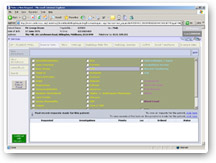‘Interop’ solution joins up labels and orders
- 19 September 2007
 |
Healthcare organisations that use Anglia Healthcare System’s ICE Desktop software to provide electronic messaging services will be able to process order requests and print specimen labels faster following a new collaboration with labelling specialists, QuickTrace.
The companies have worked together on a specially-designed, interoperable version of QuickTrace’s labelling solution, called LabelTrace for Interop.
The new ‘Interop’ version enables staff to send test electronic requests and print labels for samples at the same time, using data from third party clinical systems.
LabelTrace for Interop is launched from the clinical system and provides the option to directly access Anglia’s ICE Desktop. As ICE Desktop is launched, the relevant patient and practice data is automatically transferred from the clinical system which, Anglia says, greatly speeds up the process of making an online test request.
Using existing patient data ensures that the data is accurate and complete, new patients and temporary residents can be added quickly and easily, and it is easier to avoid making duplicate entries, the collaborating companies say.
Alan Gardner, practice manager, Hope Family Medical Centre, Flintshire, which has been successfully trialling the solution, said: “LabelTrace for Interop has meant that we no longer have to manually enter a patient’s data each time we make an on-line test request through ICE Desktop. This saves a huge amount of time, both in not having to re-type patient information and not having to manually log-in to ICE Desktop.
“The ability to utilise the existing patient data from our own clinical system ensures that it is accurate and complete. New patients and temporary residents can be added to ICE Desktop quickly and easily and it is now simpler to find and remove duplicate entries. The ‘Interop’ capability also helps us to avoid making duplicate entries in the first instance.”
Existing LabelTrace users can upgrade to LabelTrace for Interop. Users who deploy LabelTrace for Interop can also purchase the full labelling functionality.
Bill Steven, director of sales and marketing for Anglia said: “Our collaboration with QuickTrace enables all GPs to use their clinical systems to take advantage of ICE Desktop. Further collaboration between ourselves and QuickTrace will include the ability for ICE Desktop to print small specimen labels on dedicated label printers and the utilisation of LabelTrace as a robust back up in the event of network failure between GP surgeries and hospital laboratories.
“Users will have the ability to continue to make test requests off-line which will be stored and uploaded to the laboratory system when the network connection is restored. Together we will be delivering solutions designed to help GPs streamline their processes allowing both them, and their primary care staff, to spend more time dealing with patients.”
Colin Hampton, managing director of QuickTrace, added: “The design of LabelTrace for Interop was a natural progression for us as we already provide a widely deployed market leading healthcare labelling solution. Working closely with Anglia it was clear that there was a need for ‘middleware’ that would deliver an interoperability solution for clinical systems that do not provide native support for the Interop process.”
Links




